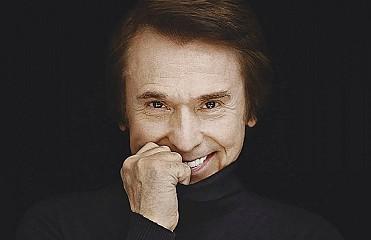Raphael concerts Tour 2025
5 upcoming concerts
5 upcoming concerts

Rafael Martos Sánchez, known internationally as Raphael, is one of Spain's flagship singers. His vocal quality, together with a great histrionic and expressive capacity, have conquered audiences all over the world for more than four decades.
Born in Linares (Jaén) (hence his nickname "Ruiseñor de Linares") on 5 May 1945, from where his family emigrated to Madrid when he was very young. He excelled as a singer from a very young age; at the age of nine he received a prize in Austria as the best child's voice in Europe.
At the age of sixteen he started as a professional singer with Philips (it is said that this is where he got the "ph" that he added to his name). His first hits were "Te voy a contar mi vida" and "A pesar de todo", among others. Raphael quickly managed to develop his own brilliant and striking style, which made him an artist not only to be heard but also to be seen on stage.
After winning awards at the famous Benidorm Festival and moving to the Hispavox recording company, he began his great career as a singer by teaming up with the composer Manuel Alejandro.
In 1966 he filmed his first film as the main character: "Cuando tú no estás", followed by "Al ponerse el Sol", "Digan lo que digan" (filmed in Argentina), "El golfo" (filmed in Mexico), "El ángel", "Sin un adiós" (filmed in England), "Volveré a nacer" and "Rafael en Raphael".
Among his most famous songs from this period are "Yo soy aquel", "Cuando tú no estás", "Mi gran noche", "Digan lo que digan", "Tema de amor", "Estuve enamorado", "Desde aquel día", "Huapango torero", "Sandunga" and "Llorona", the last three of which are of Mexican origin. In 1966 and 1967 he represented Spain in the Eurovision Song Contest with his hits "Yo soy aquel" and "Hablemos del amor", finishing 7th and 6th, which made him an internationally known artist, starting an endless series of tours, singing in the most important theatres in the world.
In 1972 he left Hispavox and signed with Parnaso Records.
On 14 July of the same year, he married journalist and writer Natalia Figueroa. The wedding took place in the city of Venice (Italy), to avoid journalistic harassment. They had three children: Jacobo, Alejandra and Manuel, of whom Raphael says: "They have been my best concerts".
He also ventured into soap operas, with the Mexican production "Donde termina el camino", broadcast in the spring of 1978 in Mexico and later in South American countries such as Peru and Chile.
Faced with the push of new balladeers such as Camilo Sesto, Miguel Bosé, in the early eighties, resumed his level with songs such as "¿Qué tal te va sin mí?", "Como yo te amo", "En carne viva" and "Estar enamorado". In 1984 he recorded his first production with compositions by José Luis Perales such as "Ámame", "Yo sigo siendo aquel", and "Estoy llorando hoy por ti".
He later joined Columbia (now Sony Music), where he continued his career with compositions by Roberto Livi such as "Toco madera", "Maravilloso corazón" and "Escándalo". At the end of the 90s, after working for PolyGram, he returned to EMI. In 1998 he published the first part of his memoirs, "Y mañana qué?", which covers his childhood up to the time of his marriage.
In 2000 Raphael appeared in theatre, a pending subject for the artist, with the staging of the musical Dr. Jekyll and Mr. Hyde, which ran for seven months to great acclaim.
Raphael's health was affected by a liver problem which was solved by a transplant in 2003, making the singer an active promoter of organ donation.
Raphael can be considered one of the "historic" singers in the Spanish language of the second half of the 20th century, on a par with Joan Manuel Serrat, Julio Iglesias, Rocío Dúrcal, Marisol and Rocío Jurado, and for having won the "Disco de Uranio" - the only one of its kind in the world - for the sale of more than 50 million copies of his album "Ayer, Hoy y Siempre" (Yesterday, Today and Forever).
In 2006 he released another album - "Cerca de ti" (EMI) - which soon received a gold record in Spain. In 2007 he continues a world tour started in 2006 - also called "Cerca de ti" - in which he presents a selection of his hits without an orchestra, preferring the intimate accompaniment of a piano.